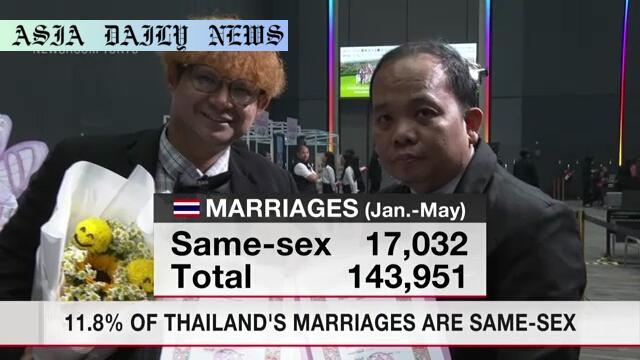Same-Sex Unions – Five months have passed since Thailand became the first country in Southeast Asia to legalize same-sex unions.
Thailand legalized same-sex unions in January, becoming the first in Southeast Asia to do so.
In five months, 11.8% of all registered marriages in Thailand were LGBTQ unions.
New legislation grants equal rights to LGBTQ couples, including tax, inheritance, and adoption benefits.
Activists emphasize the need for broader gender equality laws in the country.

Thailand Leads Southeast Asia in LGBTQ Rights
Thailand made a historic move in January, becoming the first country in Southeast Asia to legalize same-sex unions. This significant step is a progressive leap, granting LGBTQ couples the same robust legal rights afforded to heterosexual couples. For a society often considered conservative regarding gender and sexual identity, this legislation is monumental, reflecting Thailand’s commitment to inclusivity and equality.
By May, government data reported 17,032 same-sex couples had tied the knot. This figure represents an impressive 11.8% of the 143,951 marriages registered during the first five months of the year. The adoption of the law highlights how the country has become a beacon of hope and equality for LGBTQ communities, not just domestically but worldwide.
Legal Rights and Protections Under the New Law
The law granting equality to same-sex unions in Thailand encompasses various key benefits. LGBTQ couples now have access to rights concerning tax benefits, inheritance, adoption, and shared property. These inclusions symbolize significant progress in rectifying historical legal disparities faced by LGBTQ individuals. Thailand’s inclusive framework provides an essential benchmark for the region, fostering discussions on rights and protections for all citizens, regardless of gender identity or sexual orientation.
However, this is not the culmination of the journey toward equality. Activists and advocates for LGBTQ+ rights emphasize that while this legislation is a milestone, broader laws affirming gender fluidity and the right to identify freely still need attention. Thailand’s next frontier will need to address these pressing needs in its ongoing pursuit of equity.
Room for Growth in Gender Equality
Despite the landmark progress, challenges remain. LGBTQ rights advocates have pointed out the absence of laws permitting individuals to self-identify irrespective of their sex assigned at birth. Addressing this gap is a critical necessity in Thailand’s roadmap to comprehensive equality. Activists continue to urge policymakers to legislate measures that will protect and affirm the identities of non-binary and gender-diverse individuals within society.
Moving forward, prioritizing public awareness campaigns to dismantle stereotypes and support lenient societal norms will be fundamental. Government and society must collaborate to ensure that all citizens can live authentically and without fear of discrimination, emphasizing the need for structural changes in societal attitudes beyond legal frameworks.
Global Implications: A New Chapter for Southeast Asia
Thailand’s push for LGBTQ rights is not just a national victory. It carries significant implications for the broader Southeast Asian region. By implementing these laws, Thailand is signaling to its neighbors the importance of embracing equality and inclusion. Other nations now have a model to reflect upon, paving the way toward responsive, progressive legislation at regional and international forums.
The global community will undeniably observe Thailand’s developments, recognizing the nation’s leadership in human rights reform. As a modern society, this bold step is an invitation for countries worldwide to push for broader reforms, ensuring every citizen is guaranteed dignity and rights under the law.
Commentary
A Celebration of Triumph and the Need for Future Progress
Thailand’s legalization of same-sex unions marks a monumental shift towards equality, and it should be celebrated as a significant accomplishment. Becoming the first Southeast Asian nation to make this progressive change, Thailand is not only making history but also setting an example across the globe. The impressive statistic of 11.8% of marriages being same-sex couples within five months showcases how eagerly this community has embraced inclusivity and recognition.
A Step Forward, But Static Isn’t Success
While celebrating this leap forward, it’s essential to address the remaining areas of inequality. One of the pressing concerns is acknowledging gender identities beyond heteronormative categories. Thailand now stands at the forefront of LGBTQ rights in its region, but the journey to equity is incomplete until legal recognition for all marginalized groups is codified. This requires a deep dive into constitutional frameworks and cultural acceptance to further bolster the progress already made.
Unity in Advocacy
What resonates most about Thailand’s achievement is the message of unity and advocacy. Behind every legislative reform, there are tireless voices advocating for visibility and acceptance. The acknowledgment of the LGBTQ community’s rights is a triumph of human dignity, and it can inspire constructive dialogues in other nations. Equality remains an ever-evolving goal, and Thailand’s efforts offer a valuable model of engagement and progress. Let this monumental shift be a harbinger of the inclusive changes the world strives to achieve.


